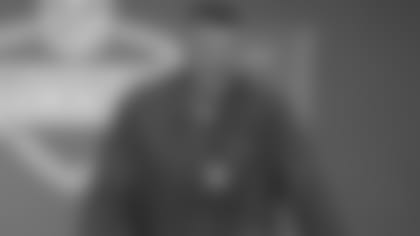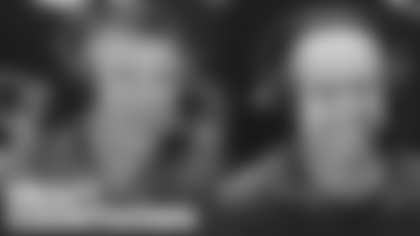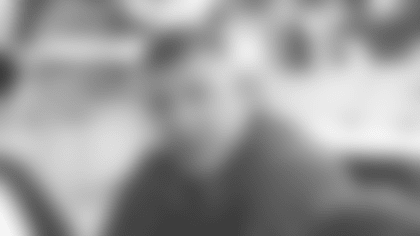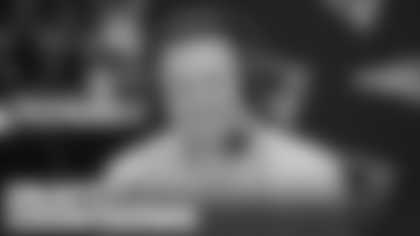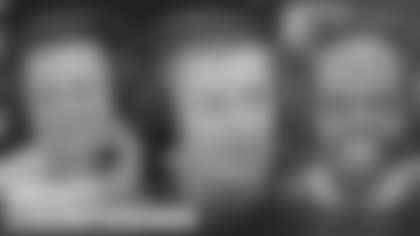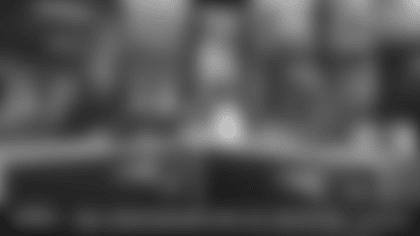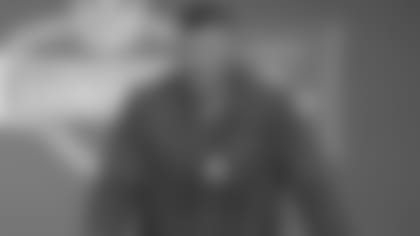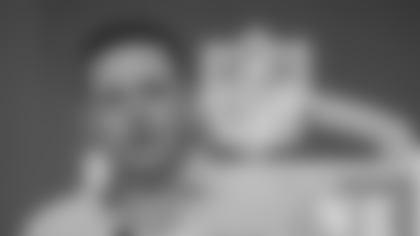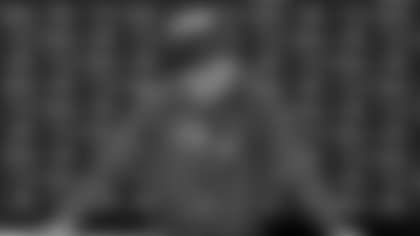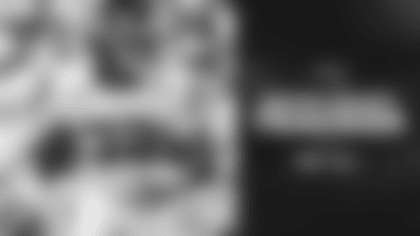PATRIOTS OFFENSIVE COORDINATOR JOSH MCDANIELS
Q: Last year in the AFC title game against the Jaguars, the Patriots were 3-for-12 in third-and-long situations. What does Jacksonville's defense do that makes it so difficult on third down, and how important is it to stay out of third-and-long against this particular defense?
JM: That situation is never one that's highly converted in our league against any team. I would say it's even worse against this team who's one of, if not the, best defenses in the league. You know, they can rush, they can cover, they're very fast, they don't give you a lot of big holes and windows in their coverage when they play zone, they have good cover players when they play man-to-man and certainly the clock is ticking on every pass play because their rush is so good. Third-and-long, it usually results from poor play on first and second down, and we caught ourselves in too many of those last year against this team. It's not an ideal situation against them and you're going to have trouble converting many if you're in them. Our goal is certainly to try to play as well as we can on early downs to try to avoid those, and if you ever do find yourself in those situations, you got to be careful, got to be smart, because those are also high turnover downs too.
Q: How much was the usage of the two-running back sets against Houston a result of lack of depth at the wide receiver position?
JM: We go into each game plan with a number of different personnel groupings that we could use based on how we're being played in the game and some of them may or may not get used more or less based on the reaction from the defense and/or the grouping that they put on the field. We really don't go into it saying, 'We're really light here or heavy there.' We have a number of different people that can contribute on our offense. We feel good about that. Sometimes those groupings can get used more in a certain game when you didn't expect it, whether that's any - Detroit - you know, 12 personnel, 22 personnel, 13, 11, 10, you got a lot of different groupings and much of that is determined as the game is going. We just try to use the guys in positions where they can do something that they're pretty good at and we try to do that on Sunday.
Q: What kind of advantage does it give the offense to have both James White and Rex Burkhead on the field at the same time?
JM: That really depends how you're played or defended, and I think that's true of any personnel grouping. You try to see what they're doing or how they're playing you and then try to - at some point, you try to play to your strengths and protect your weaknesses. It really - like I said, it's not a, you put them on the field and automatically you get these advantages. You put any personnel grouping on the field and potentially have an advantage if you execute. And, our game and our performance usually comes down to how well we play, how well we execute and how well we protect the ball and stay out there on third down and convert.
Q: One of the highest compliments anyone can give a pass catcher is he's open even when he's covered. I asked Bill Belichick about that with Rob Gronkowski and he said you see a lot of that in practice. Do you have a memory that comes to mind that stands out to you in that regard?
JM: Maybe not one in particular but I think that that's where those tight - I mean, you can say that's a fundamental that you work on in practice because not every play's going to be open by 4 yards, and most of the time in our league, there's going to be somebody close to you when you're catching the football. So we try to work on those fundamentals in practice. That's also an area of ball security. I think that's really important - a contested catch. It may not result in a turnover sometimes - it could result in a dropped ball or a missed third down conversion - but we try to give those guys, or simulate as much as we can, somebody that's close to them, hit their arms as they're catching the football so that we can build up those fundamentals when we need them in the game. I would say our receivers, our backs and our tight ends all work at that, and obviously Rob has excelled at that in the past and made some really tremendous catches the other day.
Q: How do you look at those seam passes that Rob Gronkowski caught the other day? To a layman, it looks like it could be a high-impact collision area on the field. Do you view that area on the field as high-impact, and does that affect how often you'd like to or try to go there as an offense?
JM: Well, I think a lot of that is dependent on how they're defending the deep field. Certainly, if there's players back there in and around that area, it makes those throws more difficult to attempt and there's ways to try to - if you can try to create a little bit of space, then that's something that you can attempt to do as well. The other day, we found a little bit of space there in the middle, partly because of what they did defensively. And then the other one, it was very highly contested but the guys were kind of running down the field with him. Last year, I believe in the Jacksonville game, in the AFC Championship Game, we actually had one and I believe it was [Barry] Church made a good break on the ball and hit Rob [Gronkowski] pretty good. You know, you've got to pick your spots, but I think more importantly, you've got to just read it out. If you call them a number of times in the game, then the quarterback - his responsibility is to try to get the ball to the right spot and certainly if those areas of the field are defended with a lot of bodies, then we'd love to go somewhere else with it and Tommy [Brady] does a great job of that.
Q: Tom Brady said this offense is a tough one for receivers to learn. What kind of things can you teach receivers and how does that process work for you as a coach of that position?
JM: Well, first of all, we have a great receivers coach in terms of Chad O'Shea. I mean, he does a tremendous job, as good as any I've been around. He prepares those guys well every week. He prepares them starting in the offseason to re-learn and re-acclimate to our foundation, the things that are important. And look, we have - there's parts of every system and every offense that are more complex than others and there's parts that are simple. I think that depending on what we're talking about, and what - which four people, which five people, which two people, which person. If you're talking about somebody who's played in the system for 10 years, that's different than somebody who's kind of just getting started in it. We're sensitive to that, and like I said, Chad does a tremendous job in evaluating where those guys are at and what they can or can't do and what they should and shouldn't do. And hopefully, we're trying to make great decisions as a staff and put people in places where they can go out there and do something that they do well. That's our goal. In our profession, it's very rare for everybody to be at the same point in terms of their development in our system and their aptitude in terms of what they know. I mean, Tom's [Brady] a great example of that. He's been in the system for so many years. And, you've got Brian Hoyer who's been in it for a number of years - not as many as Tom - and then you've got Danny Etling, who's just getting started in it. There's varying degrees of that I would say across the board on offense and defense and the kicking, and what we're tasked with each week is to try to get the group that's going to play out there to do the things that they can do and not try to overdo it if they're not ready to do it yet.
Q: What did the pre-snap motion of the running backs provide on Sunday?
JM: There's a lot of pre-snap movement in general terms and I would just say any pre-snap movement, sometimes it can help you, sometimes it just forces communication a little later and all that. I think sometimes there's more made of things like that then really that the group is getting out of it and sometimes it's just used to splash the water. There were plenty of times in the game where we didn't do anything like that and then there was a few that we did. Houston handled it very well and we got something out of it I guess and it's not something that you'll probably see us do every week.
Q: James Develin had four catches against Houston. What's it like working with a guy like Develin who's primarily known for his work in the blocking game but can be a viable and reliable option when called upon in the passing game?
JM: James is - I mean, he's very dependable in his role. He's an incredible teammate, he's one of the hardest workers we have every single year and extremely unselfish. It doesn't surprise me at all that he came through for us in those situations, and whatever we ask James to do, he's more than ready and willing to do it. He works really hard to know his role in the game plan each week, whether that's on offense or in the kicking game. He's a guy that you really enjoy seeing when you walk into the meeting room every day because you know he's prepared, you know he's ready for the challenge ahead and I'm sure he's excited to get ready to compete against Jacksonville on Sunday.
PATRIOTS SPECIAL TEAMS COACH JOE JUDGE
Q: As it comes to the kickoff coverage and kick return games on Sunday, is it making excuses to take into account that it's hard to simulate those during training camp and that you had several players miss time due to injury?
JJ: Look, I mean, this part of the season is all about improvement. That starts with the coaches, and we're all accountable for it. But, in everything we do, in all the phases, we're looking at everything and trying to find a better way to do it. There's some fundamental stuff that we have to get right, I have to correct, and I don't think there's any excuse to be made for anything. We're all playing within the same rules, and this time of year, a lot of times it's working different combinations of players and getting guys in the right position to make plays next to one another.
Q: I want to ask you about Ryan Allen's progression and development in situational punting. Can you describe what you've seen since he made this team as a rookie free agent, and in particular what he's shown you the last couple of years, especially in how he handled that particular play on Sunday with the punt to the 1-yard line?
JJ: Yeah, I'll tell you what. I think Ryan's evolution as a player has really been outstanding. When he came out of college, the biggest thing he had, he was a strong-legged guy, he had big numbers in college, you saw a potential for big hits down the field. And what he's really developed into is a great situational punter. The thing people have to understand is you're never going to lead the league in New England in any statistical category as a punter for a lot of reasons - because of the weather, the wind - but mostly because of a lot of the situations. When you play with a good offense, a lot of times you're punting on shorter fields, and it's your job to operate within those situations as best you can. If you're on a team that doesn't have a good offense, you're banging away from the minus 20-yard line a lot and you can create big numbers. But, if you're in that zone where it's just outside field goal range and it's on the other side of the 50 and you've got to pin it on down there, really a lot of times his most impactful punts and his most important punts are the ones where he's only going to be able to gross or net 35 yards. The one thing Ryan's really worked hard in is operating to give our gunners a chance to play it down the field. You saw that the other day with him working with Jon Jones. That's a very difficult situation, not only for Ryan to have to operate under the kind of pressure the Texans were bringing in a got-to-have-it situation, but to be able to operate with the placement down the field and not pinning it into the end zone where they're going to get the 20-yard line to start the drive. I think one thing Ryan works tremendously hard at in practice every day are his mechanics to be consistent, but within that he's consistently putting pressure on himself on a daily basis to operate on those shorter punts or the backed-up punts or the hard-direction punts. Or, anytime we go out there on our practice fields and there's a drastic amount of wind or there's rain or snow or anything that we can work with element wise, whether it's a day that he has a heavy load or not, Ryan will go ahead and start working on it knowing he may not get another opportunity to work in those elements, and as soon as they come up, it's got to become our advantage to operate in the elements better than the opponent. His job is not to beat everybody in the league every week with numbers. His job is to beat the specialists on the team with how he functions within the game and the flow of it.
Q: During training camp we saw Rex Burkhead, Patrick Chung and Chris Hogan returning punts in practice, and all of those guys kind of have limited experience in games in that role. But, what's your level of confidence if any of those guys do have to be thrust in that role during a game?
JJ: Well, we won't put anyone on the field if we don't have trust in them, number one. My job as a coach is to prepare everybody on the field the best I can and establish as much depth at every position as best I can, not just for finding the best 11 that are available at the time, but looking past that and seeing the ripple effect that may happen through inactives or in-game injuries or situational adjustments we're going to have to have. So, we're always preparing multiple guys on the team. We're always working ahead and thinking the 'if, then, what' type scenarios. They all work very hard. They're guys that are before practice, after practice and in practice period guys getting extras, so anytime we put them on the field, we know the level of work they've put in going into it and that they're giving the team the best chance of success in that role. I know there's a lot of questions right now in terms of what's the next step going to be, but I'd just say that this isn't really very unfamiliar territory for us. Going into the second game last year, if you remember, we didn't have Julian [Edelman] and Danny [Amendola] wasn't at the game in New Orleans last year. We ended up going with Patrick. He was one of several guys who were a part of that option, and due to roles within the game, he ended up handling it for that game. So, we've had different times when we've had to put different guys back there for different situations, whether that's as a punt returner or on a safety kickoff return where you're using multiple punt returners on the unit. So, it's never just training one guy for a fourth down. You're always looking at all the situation plays that may come up throughout the game and how you can best use everyone on your roster.
Q: Can you give us an assessment of the kickoff coverage unit on Sunday? It seems like you gave up some longer kickoff returns than usual.
JJ: You know what, at this point, we're really looking forward to what we have to do against Jacksonville coming up and what we can do to improve that unit. Again, this time of year, it's all about improvement and that's in every phase. It's beyond just the kickoff unit - it's every phase we put on the field every week. There's always challenges, and right now we're focused on the challenges that Jacksonville is going to bring towards us, and they're an explosive team in all phases. So, with the speed they're putting on the field, we've got to make sure that we improve everything and move forward to correct any mistakes we have.
Q: Can you illuminate the key differences between catching and returning punts versus kickoffs? If you were to coach a player who had done one but not the other to do both, how would you go about doing that?
JJ: I'll tell you what, that's a great question because a lot of people assume that, 'Well, if you can catch a kickoff, you can catch a punt.' And they're two very, very different plays. They're two very, very different balls to field. Kickoffs have much more of a linear path to them. They're a much easier flight to judge and to get set up on, as well as normally kickoffs have an easier determined depth that you have to work to. Punts - the best equivalent you can have is playing center field in baseball, and you're truly judging the flight of the ball. You're not only just worried about the distance of the ball, but you're also worried about the curve and the break of the ball based on the nose up or nose down, you're worried about the crosswind and how that could play a factor, and you're worried about the bodies around you that you may be coming up into a crowd or setting up laterally and making sure you're clear on it. Judging a punt is a very difficult thing to do, much more difficult than most people would think. While a lot of times people have the kind of conception of just go back there and catch it, there's a lot more to it than that. There's a lot more variables in catching a punt and it's definitely something that takes a lot of courage to do to sit on back there with your eyes in the air, trusting your blockers in front of you and having the awareness around you to go ahead and make the play.
Q: What makes a player good at standing back there and watching a punt come to them and being able to judge that? Is it a matter of eyesight, a natural skill or something learned?
JJ: I don't think it's absolutely natural. I think you have to develop a feel and learn it over time. I think it's something that some players have better instincts for than others. Some things you kind of find out about players early on when you talk to them coming out of college, or you get them early on and they come into your camp, you try and find out about them, one of the questions as a special teams coach I asked everybody is, 'Did you grow up playing baseball?' Because normally guys who grew up playing baseball are used to judging the ball in the air and getting their body under it. A lot of guys have difficulty judging it in the air, knowing when to come forward, when to go back, anticipating with the nose of the ball up or down and dealing with the wind, how much it's going to break in either direction. I don't think anything about it a natural skill. I think some guys have better natural instincts maybe, but I think it's something you definitely have to work on over time and develop a feel.
Q: After one week of seeing the new kickoff rules play out, what is your biggest takeaway as to the impact of the new rule on the kickoff?
JJ: To be honest with you, Mike [Reiss], I think it's still a very small sample size of what we're going to see. I still believe, as the season develops, we're going to see a lot more happen. I know there were a greater number of touchdowns and a higher drive-start average this week in the league than there's been in past years. I think there's still room for impact on a kickoff coverage or a kickoff return unit based on how they execute and how the matchups favor them. I think there was enough to see that the play is still very much an impact play and has potential to be an even greater impact play on both ends. But, I do think that this play will continue to develop as the season goes, as coaches and teams not only find different ways to attack it but as the rosters also evolve based on injuries, based on necessities by each team offensively and defensively and what you're able to carry on the 53 and the active roster. So, it will be interesting to see how different teams who rely more on size and different teams who rely more on speed kind of adjust in the way that our own game plan, week-by-week, how we can match up with those teams.
Transcripts are provided by the Patriots media relations department as a courtesy to the media and are edited for readability. All press conferences are posted and archived in their entirety at patriots.com.















